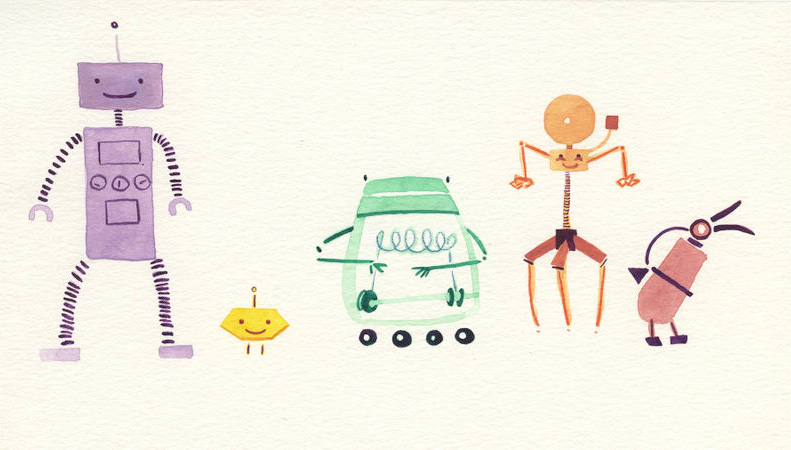Difference between revisions of "Robot"
Caseorganic (Talk | contribs) |
Caseorganic (Talk | contribs) |
||
| Line 1: | Line 1: | ||
[[Image:robots-maggie-nichols.jpg|450px|right]] | [[Image:robots-maggie-nichols.jpg|450px|right]] | ||
===Definition=== | ===Definition=== | ||
| − | "Merriam-Webster describes a robot as a "machine that looks like a human being and performs various complex acts (as walking or talking) of a human being", or a "device that automatically performs complicated often repetitive tasks", or a "mechanism guided by automatic controls".<ref>[http://www.merriam-webster.com/dictionary/robot "Robot". Merriam-Webster Dictionary. Retrieved 2008-08-04] in [http://en.wikipedia.org/wiki/Robot Wikipedia: Robot].</ref> | + | "Merriam-Webster describes a robot as a "machine that looks like a human being and performs various complex acts (as walking or talking) of a human being", or a "device that automatically performs complicated often repetitive tasks", or a "mechanism guided by automatic controls".<ref>[http://www.merriam-webster.com/dictionary/robot "Robot". Merriam-Webster Dictionary. Retrieved 2008-08-04] in [http://en.wikipedia.org/wiki/Robot Wikipedia: Robot].</ref> Unfortunately, this definition is colored by the humanistic idea of a robot instead of the actual machine and functions of everyday robots. Robots in everyday life are more specialized to their functions. For instance, the bots that Google uses to index webpages have no definite shape or form, but they preform an important and invisible function for almost everyone who has ever used a computer. We are surrounded by robots every day, yet many of them we never see. |
===Etymology=== | ===Etymology=== | ||
| − | "From both the Czech and the Slovak robota. First appeared in the 1921 science-fiction play R.U.R. by Karel Čapek after having been suggested to him by his brother Josef".<ref>[http://en.wiktionary.org/wiki/robot Wiktionary - Robot]</ref> | + | The word robot "From both the Czech and the Slovak robota. First appeared in the 1921 science-fiction play R.U.R. by Karel Čapek after having been suggested to him by his brother Josef".<ref>[http://en.wiktionary.org/wiki/robot Wiktionary - Robot]</ref> |
===History=== | ===History=== | ||
Revision as of 19:42, 27 June 2011
Definition
"Merriam-Webster describes a robot as a "machine that looks like a human being and performs various complex acts (as walking or talking) of a human being", or a "device that automatically performs complicated often repetitive tasks", or a "mechanism guided by automatic controls".[1] Unfortunately, this definition is colored by the humanistic idea of a robot instead of the actual machine and functions of everyday robots. Robots in everyday life are more specialized to their functions. For instance, the bots that Google uses to index webpages have no definite shape or form, but they preform an important and invisible function for almost everyone who has ever used a computer. We are surrounded by robots every day, yet many of them we never see.
Etymology
The word robot "From both the Czech and the Slovak robota. First appeared in the 1921 science-fiction play R.U.R. by Karel Čapek after having been suggested to him by his brother Josef".[2]
History
First robots in literature. Wizard of Oz. Rossum's Robots.
